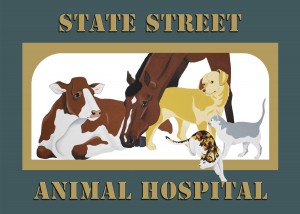Blog Archives
Home -
Articles posted by Steve Tanner (Page 2)
Lately, a common question posed to the doctors at State Street Animal Hospital has been about the use of essential oil in our pets. Essential oils, which are concentrated oils extracted or cold pressed from plants, are used for many purposes in humans including as skin and digestive remedies. People use these oils in aromatherapy and sometimes in direct application to their skin. So, if people find these products useful, why not use them to benefit our pets?
While there may be some benefits to using essential oils in veterinary care, it is important to remember 2 things:
- “All Natural” does not mean safe! Many natural agents such as snake venom and arsenic are highly toxic. Many essential oils, likewise, are irritating, toxic, or may even cause cancer, while others are more safe to use.
- Animals have a much better sense of smell than humans – anywhere from 40 to 100 times more acute. A pleasant odor to us may be overwhelming and unpleasant to our pets.
What does this all mean? Certain essential oils may be a great addition to your pet’s care. Please consult with your veterinarian to discuss any concerns or questions you have to help pick the right oil for your pet.
What is Xylitol? Xylitol is an alcohol used as a sugar substitute for its sweetness in diet and diabetic-friendly foods. It’s in your sugarless gum, sugarless mints, and sugarless desserts like pudding. Xylitol is safe for us but very toxic to your pets, especially dogs. Even a small amount can be lethal.
How can xylitol affect your pets? Xylitol causes a life-threatening drop in blood sugar, followed by severe liver damage. Because Xylitol is quickly absorbed – it can enter a dog’s blood stream within 15 minutes of consumption! A single stick of gum can cause life threatening problems for a small dog and one pack of gum can kill a large dog. Even when caught early, treating xylitol toxicity requires close monitoring for 72 hours, which may be expensive and is not always successful.
Protect your pet—keep sugarless products out of reach. Beware of purses and book bags because dogs can often smell the gum and may go searching through such areas to find the source of that yummy smell. Lastly, be aware of what human tid-bits your dog is getting. If the product is labeled sugarless, then most likely it contains xylitol. If in doubt about whether a product contains xylitol, wait to feed it and always check the label!
Reason #1 for scheduling your pet’s dental: Yuck, dog breath!
Bacteria in the mouth cause infection and odor. Nobody enjoys putrid dog breath or smelly kitty kisses. Keeping those teeth clean means a happier, healthier relationship for everyone.
Reason #2 for scheduling your pet’s dental: Clean teeth help keep the whole body healthy.
The bacteria that cause awful breath and gingivitis can also enter the blood stream and cause infection in other organs, such as the heart valves (endocarditis) and kidneys (pyelonephritis). Keeping those teeth clean helps the whole body stay healthy.
Reason #3 for scheduling your pet’s dental: infected teeth hurt.
If you’ve ever had a toothache, you know—if you haven’t had one, trust us, you don’t want one. Chronic pain can make animals less sociable. We’ve had several cases where owner’s have mentioned how much happier, friendlier or more active their cat became after the dental.
Reason #4 for scheduling your pet’s dental: save those teeth. We would rather save teeth than remove them.
If we can get the tartar off before the tooth root is damaged we can save the tooth. Once the root is infected and the tooth is loose we have to pull it to eliminate a source of constant pain and infection. Early intervention is key to preserving healthy teeth.
Reason #5 for scheduling your pet’s dental: Save money in the long run!
Dental disease is a source of chronic bacterial exposure to other organs in the body leading to infections, which need medical care. Painful teeth effect how an animal eats and digests potentially effecting weight and gastrointestinal health. Chronic dental problems lead to more teeth needing to be extracted and greater expense when a dental is done—so, keeping teeth healthy in the long run is a good investment in overall health.
February is Pet Dental Health Month. We want to encourage people to have their pets’ teeth cleaned and cared for. Therefore we will be offering a 20% discount on all dentals scheduled during the month of February.













Social